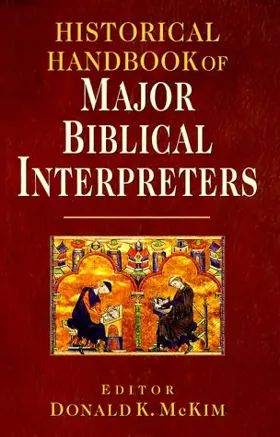

Historical Handbook of Major Biblical Interpreters
Pages
643
Publisher
InterVarsity Press
Published
1998
ISBN-13
9780830814527
The Historical Handbook of Major Biblical Interpreters is a unique reference work that recognizes that the history of Christian theology is fundamentally the history of the church's interpretation of the Bible. In this book contributors from both historical and biblical studies meet and create a reference book that will be valuable for all students and teachers of theology, church history and biblical studies. The methods, perspectives and seminal works of major biblical interpreters are placed in historical perspective and assessed by scholars who are experts in their subjects. Over one hundred biblical interpreters have been selected for their individual contributions or their representation of approaches to biblical interpretation.This handbook is organized by historical periods, from the second century to the late twentieth century, with each period introduced by an overview essay and followed by articles on the major interpreters of the period. A final section is devoted to twentieth-century North American interpreters. Valuable bibliographies include the significant works of each interpreter as well as studies of the interpreter and important studies of each period under review.
Inner Books
This physical volume has several internal sections, each of which has been reviewed independently
- Meyer, Heinrich August Wilhelm (1800-1873) by Darrell L. Bock
- George Bradford Caird by L. D. Hurst
- Matthew Henry by H. O. Old
- J. A. Bengel by J. Weborg
Reviews
Downers Grove, IL: InterVarsity Press, 1998. Pp. xxiii + 643, Hardcover, $29.99, ISBN 0830814523. Paul B. Harvey The Pennsylvania State University University Park, PA 16802-5500 Editions and works of reference seemingly similar occasionally appear simultaneously, suggesting a perceived need or, at least, shrewd awareness in distinct editorial offices of Francis Comford's famous academic principle of "ripe versus unripe time." To complement, therefore, Abingdon Press's Dictionary of Biblical Interpretation, edited by John H. Hayes, we have the present Handbook. I stress complementarity: the Abingdon dictionary is avowedly ecumenical in selection of topics and contributors, proudly eclectic in coverage of methods and personalities. This InterVarsity compendium focuses on a relatively brief list of great names, with their lives and works assessed (as expected from this publisher) from a conservative point of theological vision. The Handbook appears in a single volume of clear, double-column type, enhanced with genuinely useful indices to persons, subjects, and contents. More than a hundred biographical entries are organized into temporal blocks (“periods of church history”): “Early Church,” “Middle Ages,” “16th & 17th Centuries,” “18th & 19th" Centuries,” “20th Century Europe,” “20th Century North America.” The biographical entries are arranged within these sections alphabetically. This editorial arrangement encourages selective consultation rather than studious reading: to follow (for example) Jonathan Edwards with J.G. Eichhorn, or Kierkegaard with Bishop Lightfoot, sheds little comparative light. Scholarly practitioners of different linguistic, religious, and methodological traditions cannot convincingly be compressed into vaguely-similar chronological categories.
[Full Review]
